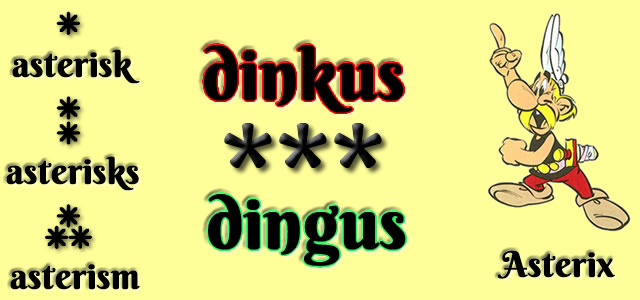

In this Adventure in Etymology we find out what the dickens a dinkus is, and what to do with an asterism.

A dinkus is:
- A small drawing or artwork used for decoration in a magazine or periodical.
- A small ornament, usually a line of three asterisks (* * *), especially for the purpose of breaking up sections of a chapter, article, or other text
It comes from German Ding (thing), from Old High German thing [ðinɡ] (thing, object, matter, case), from Proto-West Germanic *þing (court session, lawsuit, affair, matter, thing, object), from Proto-Germanic *þingą (date, appointment, meeting, assembly, matter, issue) [source].
Words from the same roots include thing in English, ding (matter, thing) in Dutch, þing [θiŋk] (assembly, meeting, council, parliament) in Icelandic, and ting (thing, court of law, legislative assembly) in Swedish [source].
Dinkus should not be confused with dingus, which can refer to something whose name you’ve forgot, i.e. a thingamajig, whatchamacallit, etc in North American and South African. In the USA and Canada it can also refer to a foolish, incompetent, or silly person [source].
Dingus was possibly borrowed from Dutch and/or Afrikaans dinges (thingamajig, whatshisname) and ding (thing).
An asterism is:
- A rarely used typographical symbol (⁂, three asterisks arranged in a triangle), used to call attention to a passage or to separate subchapters in a book (like a dinkus).
- An unofficial constellation (small group of stars that forms a visible pattern).
It comes from Ancient Greek ἀστερισμός [ˈæs.təˌɹɪz.əm] (a group of stars), from ἀστήρ [asˈtir] (star, planet, illustrious person, starfish) [source].
Asterism is also the name of a Japanese band:
The word asterisk (*) comes from the same roots, via Late Latin asteriscus (small star and Ancient Greek ἀστερῐ́σκος [as.teˈris.kos] (small star) [source].
Two asterisks on top of each other (⁑) are apparently used in texts to denote emphasis, comments, footnotes, corrections, or other similar annotations [source].